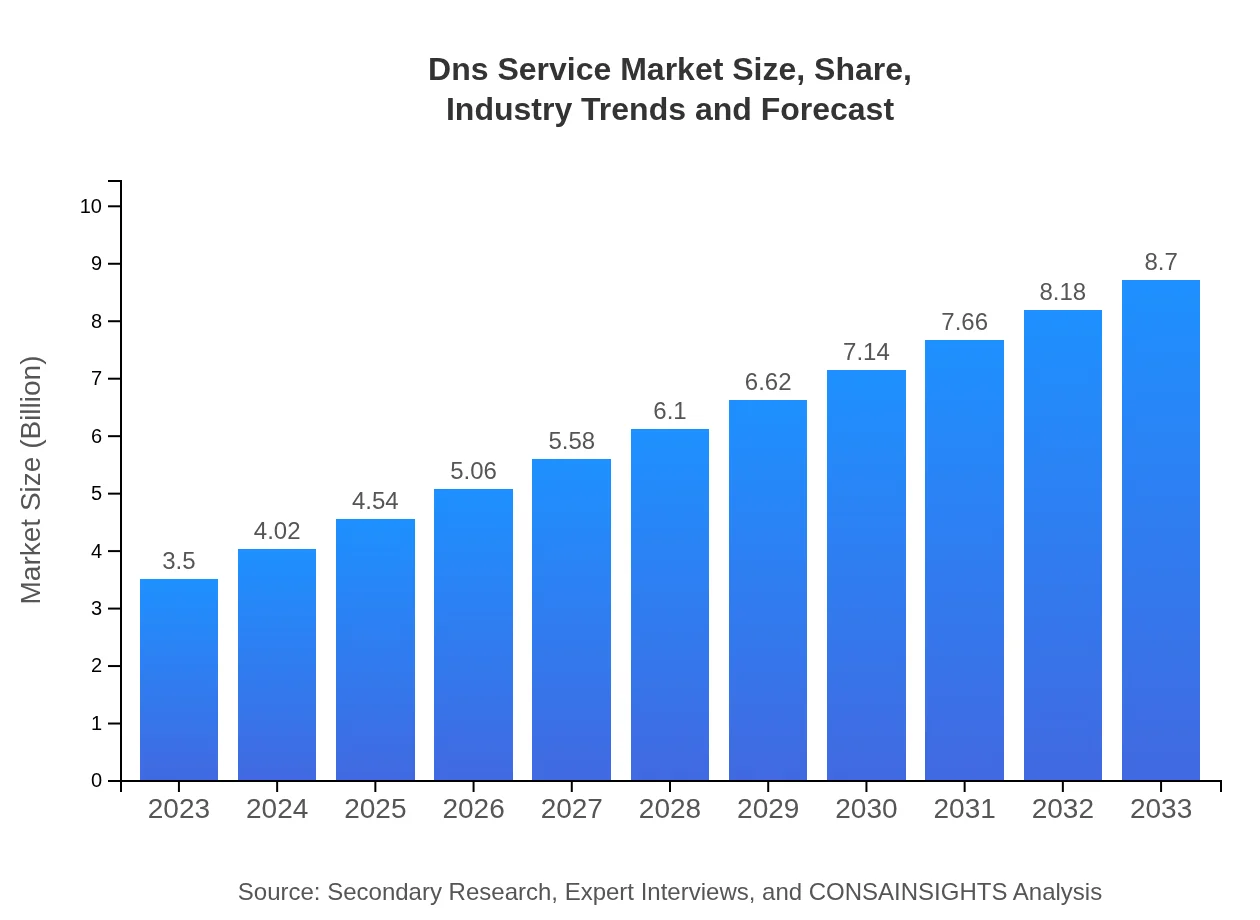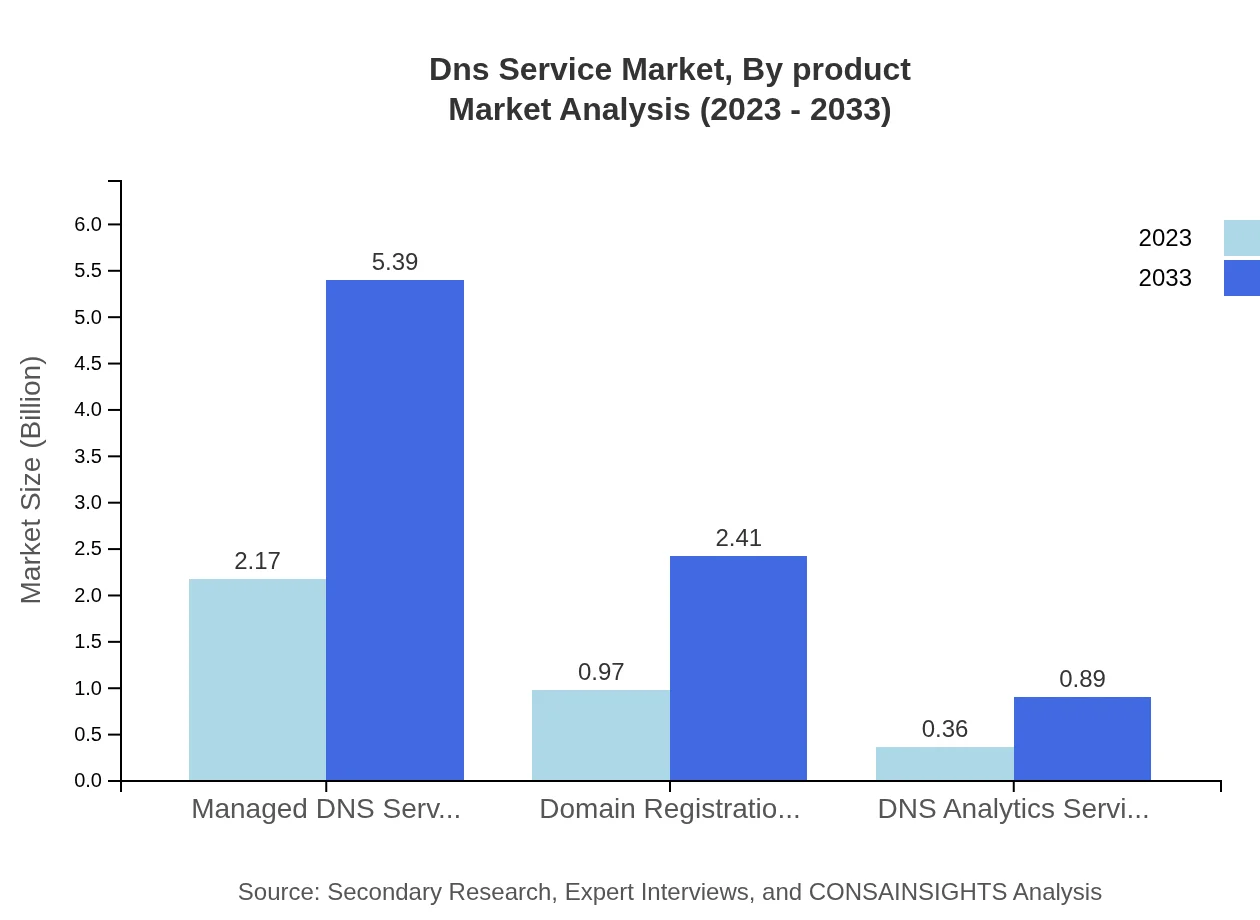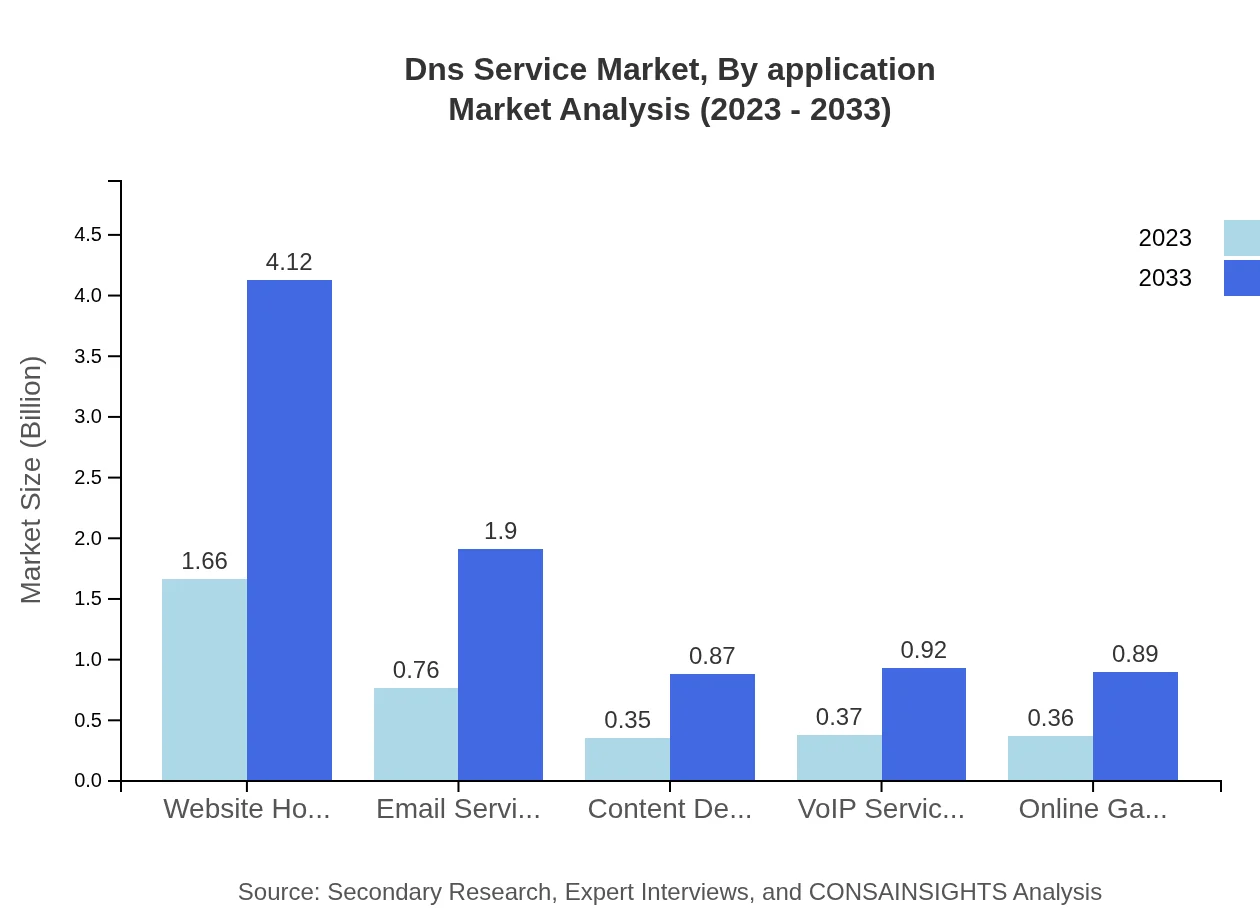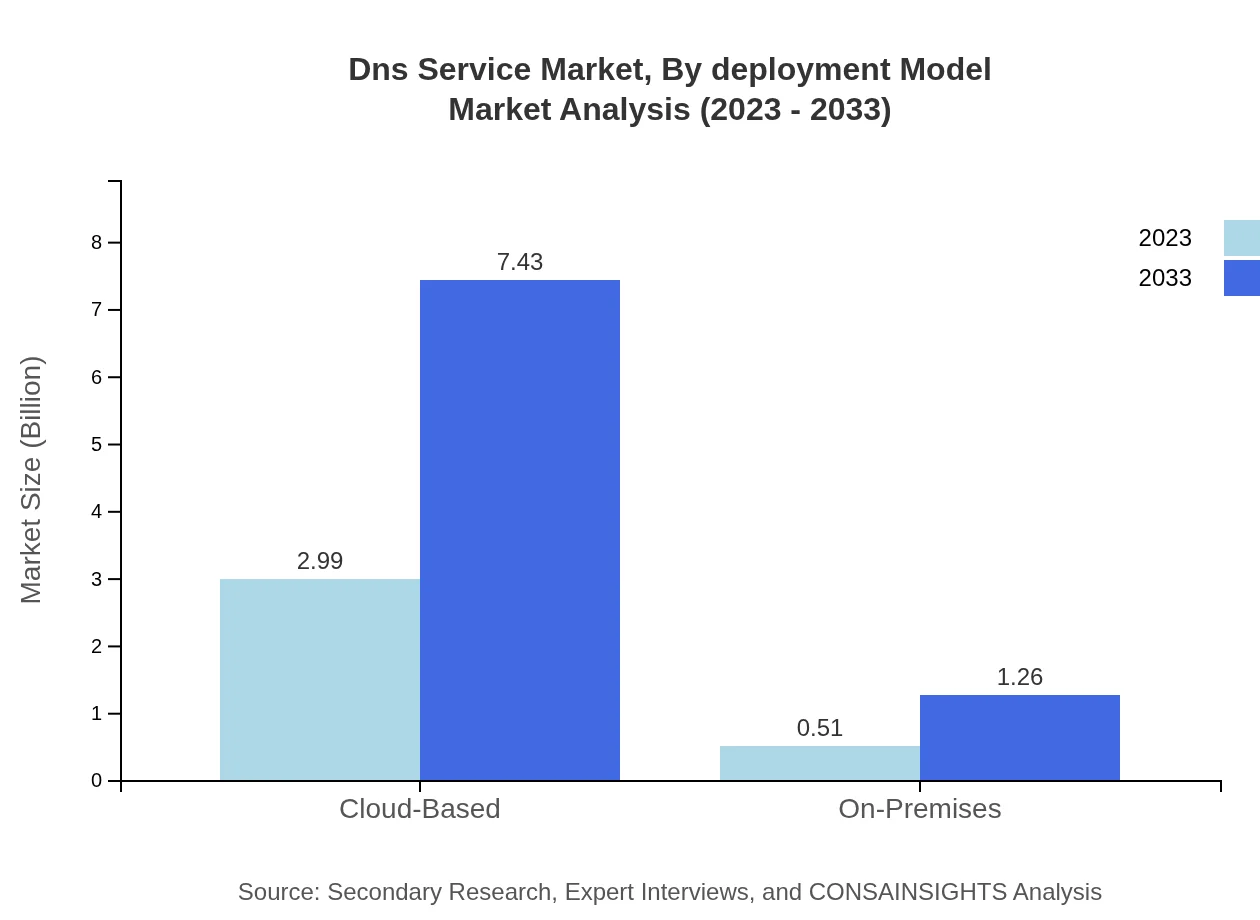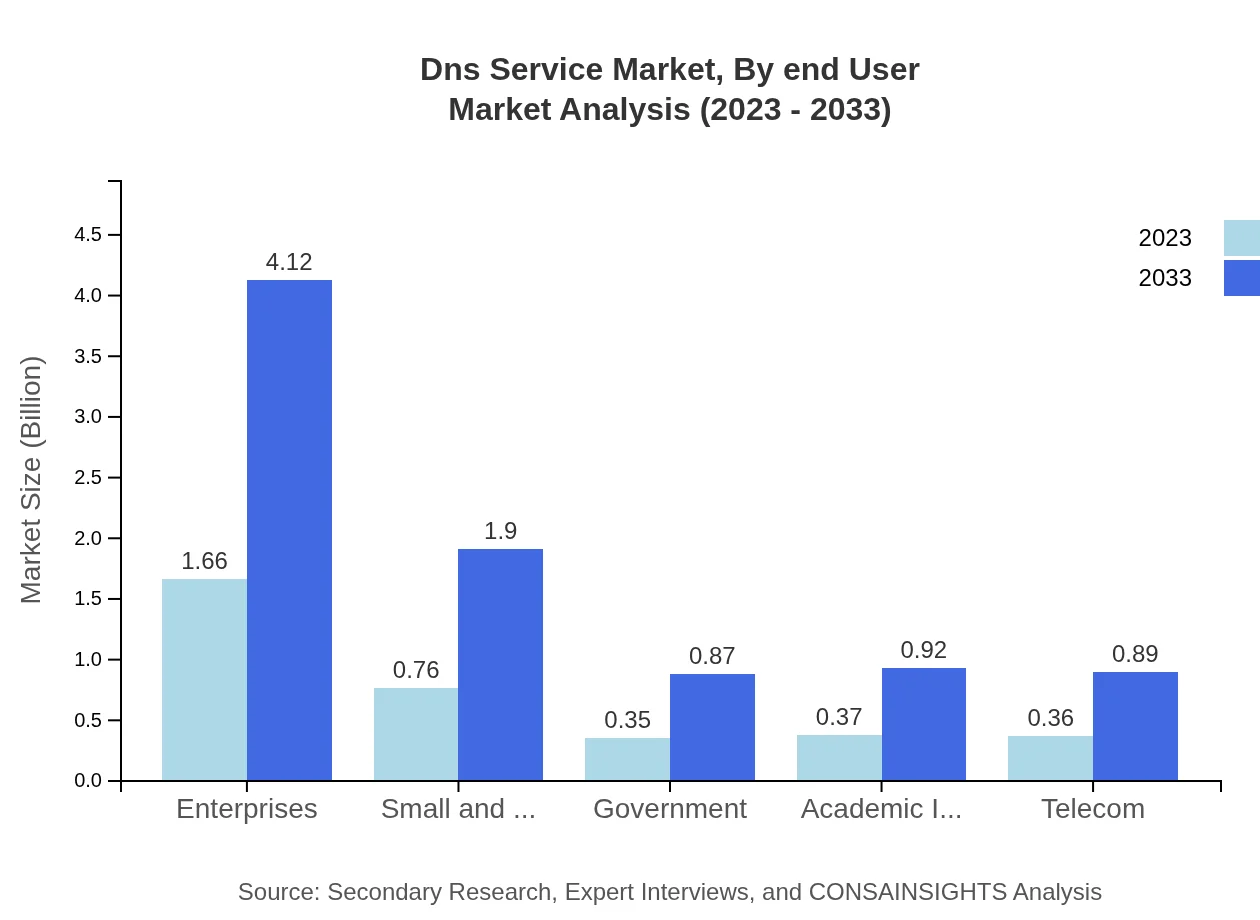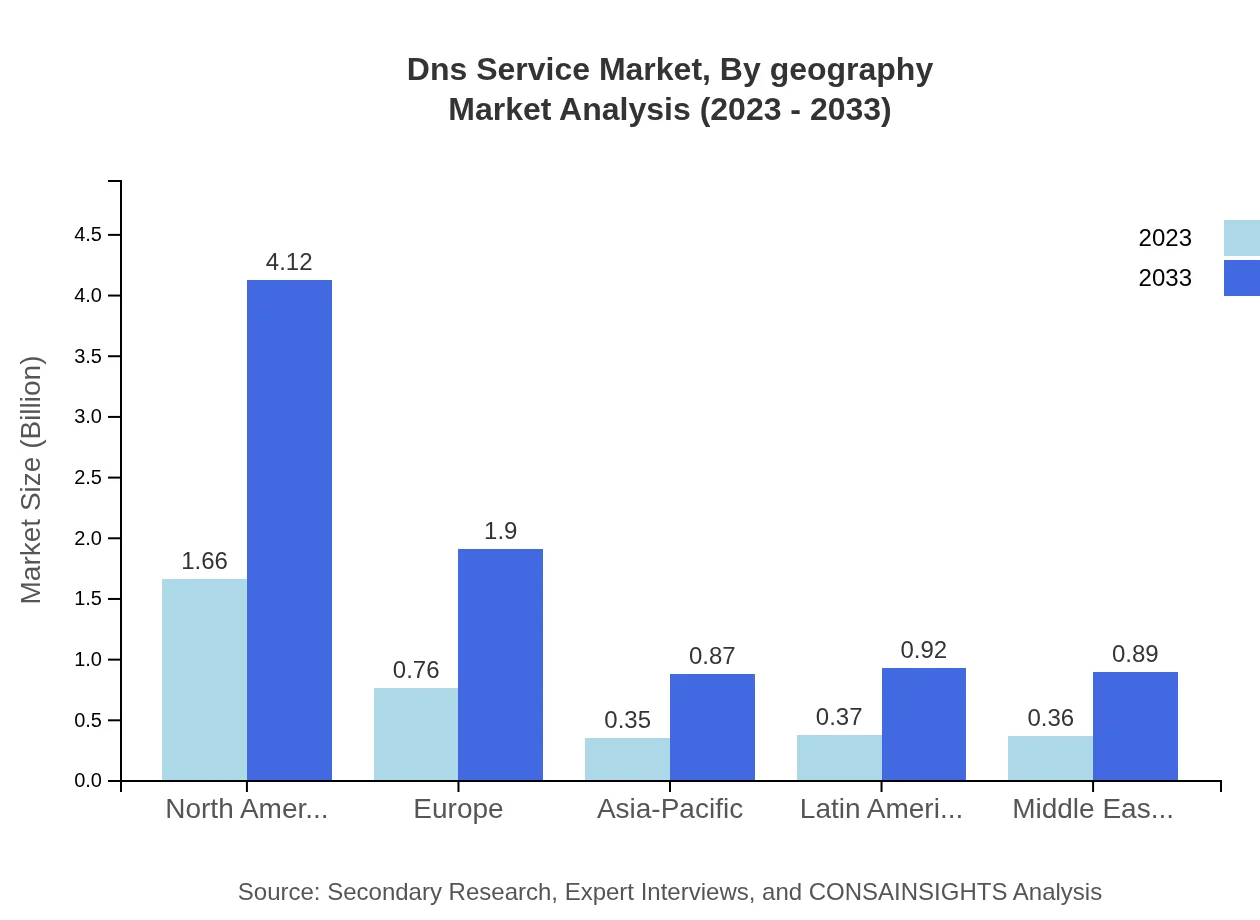Dns Service Market Report
Published Date: 31 January 2026 | Report Code: dns-service
Dns Service Market Size, Share, Industry Trends and Forecast to 2033
This report delivers an in-depth analysis of the Dns Service market from 2023 to 2033, providing insights into market size, trends, segmentation, and regional dynamics, alongside forecasts to help stakeholders make informed decisions.
| Metric | Value |
|---|---|
| Study Period | 2023 - 2033 |
| 2023 Market Size | $3.50 Billion |
| CAGR (2023-2033) | 9.2% |
| 2033 Market Size | $8.70 Billion |
| Top Companies | Cloudflare, Inc., Google LLC, Amazon Web Services, Verisign, Inc. |
| Last Modified Date | 31 January 2026 |
Dns Service Market Overview
Customize Dns Service Market Report market research report
- ✔ Get in-depth analysis of Dns Service market size, growth, and forecasts.
- ✔ Understand Dns Service's regional dynamics and industry-specific trends.
- ✔ Identify potential applications, end-user demand, and growth segments in Dns Service
What is the Market Size & CAGR of Dns Service market in 2023?
Dns Service Industry Analysis
Dns Service Market Segmentation and Scope
Tell us your focus area and get a customized research report.
Dns Service Market Analysis Report by Region
Europe Dns Service Market Report:
The European Dns Service market will grow from $1.06 billion in 2023 to $2.63 billion by 2033. Increased regulations on data privacy and security, such as GDPR, are prompting organizations to invest heavily in resilient DNS services.Asia Pacific Dns Service Market Report:
In the Asia Pacific region, the Dns Service market is expected to grow from $0.62 billion in 2023 to $1.55 billion by 2033, driven by rapid digitalization and increasing internet penetration. Key countries such as India and China are leading this growth through extensive investments in IT infrastructure.North America Dns Service Market Report:
In North America, the market is anticipated to expand significantly from $1.36 billion in 2023 to $3.38 billion by 2033. The region is dominated by innovation and advanced technological adoption, with major companies driving advancements in cloud and managed services.South America Dns Service Market Report:
The South American market, though smaller, is projected to remain stable with negligible growth, highlighting challenges in infrastructure and digital transitions. The market is expected to increase from $0.00 billion in 2023 to $0.01 billion by 2033.Middle East & Africa Dns Service Market Report:
The Middle East and Africa region present unique growth opportunities, with the market expected to grow from $0.46 billion in 2023 to $1.15 billion by 2033. Increased internet usage and ongoing projects towards smart cities stimulate demand for robust DNS services.Tell us your focus area and get a customized research report.
Dns Service Market Analysis By Product
The Dns Service market is influenced significantly by product type. Managed DNS Services are expected to dominate in size, growing from $2.17 billion in 2023 to $5.39 billion by 2033, capturing a market share of 62.01%. Domain Registration Services will also see substantial growth, increasing from $0.97 billion to $2.41 billion, while DNS Analytics Services will grow from $0.36 billion to $0.89 billion.
Dns Service Market Analysis By Application
The market is segmented into various applications, such as Enterprises, SMBs, Government, Academic Institutions, and Telecom. Enterprises will witness substantial growth, expanding from $1.66 billion in 2023 to $4.12 billion by 2033, representing a market share of 47.37%. SMBs will also grow from $0.76 billion to $1.90 billion, strengthening their market relevance.
Dns Service Market Analysis By Deployment Model
In terms of deployment models, the Cloud-Based segment will dominate with a market size increasing from $2.99 billion in 2023 to $7.43 billion by 2033, holding a share of 85.5%. In contrast, the On-Premises segment will represent a smaller but steady increase from $0.51 billion to $1.26 billion, comprising a 14.5% market share.
Dns Service Market Analysis By End User
End-users of Dns Services include varied sectors. Notably, Website Hosting services will account for significant growth from $1.66 billion in 2023 to $4.12 billion by 2033, along with Email Services growing from $0.76 billion to $1.90 billion, representing shares of 47.37% and 21.81%, respectively.
Dns Service Market Analysis By Geography
Geographically, North America and Europe will remain leaders in the Dns Service market, while the Asia Pacific region is rapidly gaining traction due to technological advancements and increasing internet connectivity. South America shows potential for growth but faces challenges, whereas the Middle East and Africa show a promising upward trajectory amidst expanding digital ecosystems.
Dns Service Market Trends and Future Forecast
Tell us your focus area and get a customized research report.
Global Market Leaders and Top Companies in Dns Service Industry
Cloudflare, Inc.:
A leading provider in the DNS services market, Cloudflare offers scalable DNS solutions that protect against cyber threats while enhancing website performance.Google LLC:
Google DNS, a widely-used public DNS service, emphasizes security and speed, significantly influencing the global DNS landscape.Amazon Web Services:
AWS provides extensive cloud-based DNS solutions via Route 53, catering to large enterprises and enhancing their DNS management capabilities.Verisign, Inc.:
Recognized for its authoritative DNS services, Verisign plays a vital role in maintaining the stability and security of internet infrastructure.We're grateful to work with incredible clients.









FAQs
What is the market size of DNS Service?
The DNS Service market is projected to reach approximately $3.5 billion by 2033, with a Compound Annual Growth Rate (CAGR) of 9.2% from 2023. This growth reflects increasing demands for managed services and domain registrations.
What are the key market players or companies in the DNS Service industry?
Key players in the DNS Service market include major technology firms specializing in internet infrastructure like Cloudflare, GoDaddy, Akamai, and Amazon Web Services. These companies drive innovation and propose varied solutions tailored to diverse customer needs.
What are the primary factors driving the growth in the DNS Service industry?
Growth in the DNS Service industry is driven by increasing internet penetration, burgeoning cybersecurity threats, and the rise of cloud services. Moreover, the transition to managed DNS services enhances operational efficiency for businesses.
Which region is the fastest Growing in the DNS Service market?
The North American region is the fastest-growing segment of the DNS Service market, expected to expand from $1.36 billion in 2023 to $3.38 billion by 2033. This growth is fueled by high adoption rates of digital services and technological innovation.
Does ConsaInsights provide customized market report data for the DNS Service industry?
Yes, ConsaInsights offers customized market report data tailored to specific client needs in the DNS Service industry. This enables businesses to access relevant insights and statistics for their strategic decision-making processes.
What deliverables can I expect from this DNS Service market research project?
Deliverables from the DNS Service market research project include comprehensive reports, market analysis, competitor profiles, growth forecasts, and trend insights, offering valuable data for strategic planning and investment decisions.
What are the market trends of DNS Service?
Current trends in the DNS Service market include a shift towards cloud-based solutions, heightened focus on security features, and increased integration of machine learning for predictive analytics. These trends highlight the evolution of DNS as a critical component of IT infrastructure.

